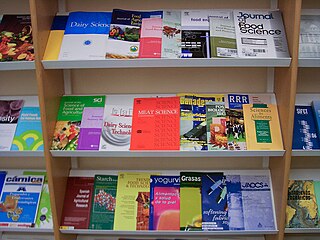
Knowledge management (KM) is the collection of methods relating to creating, sharing, using and managing the knowledge and information of an organization. It refers to a multidisciplinary approach to achieve organizational objectives by making the best use of knowledge.

Knowledge transfer refers to transferring an awareness of facts or practical skills from one entity to another. The particular profile of transfer processes activated for a given situation depends on (a) the type of knowledge to be transferred and how it is represented and (b) the processing demands of the transfer task. From this perspective, knowledge transfer in humans encompasses expertise from different disciplines: psychology, cognitive anthropology, anthropology of knowledge, communication studies and media ecology.

An International Standard Serial Number (ISSN) is an eight-digit serial number used to uniquely identify a serial publication (periodical), such as a magazine. The ISSN is especially helpful in distinguishing between serials with the same title. ISSNs are used in ordering, cataloging, interlibrary loans, and other practices in connection with serial literature.

An academic journal or scholarly journal is a periodical publication in which scholarship relating to a particular academic discipline is published. They serve as permanent and transparent forums for the presentation, scrutiny, and discussion of research. They nearly universally require peer review for research articles or other scrutiny from contemporaries competent and established in their respective fields.

Open access (OA) is a set of principles and a range of practices through which nominally copyrightable publications are delivered to readers free of access charges or other barriers. With open access strictly defined, or libre open access, barriers to copying or reuse are also reduced or removed by applying an open license for copyright, which regulates post-publication uses of the work.

A decision support system (DSS) is an information system that supports business or organizational decision-making activities. DSSs serve the management, operations and planning levels of an organization and help people make decisions about problems that may be rapidly changing and not easily specified in advance—i.e., unstructured and semi-structured decision problems. Decision support systems can be either fully computerized or human-powered, or a combination of both.
Medical billing, a payment process in the United States healthcare system, is the process of reviewing a patient's medical records and using information about their diagnoses and procedures to determine which services are billable and to whom they are billed.
An online community of practice (OCoP), also known as a virtual community of practice (VCoP), is a community of practice (CoP) that is developed and maintained on the Internet. OCoPs include active members who are practitioners, or "experts," in the specific domain of interest. Members participate in a process of collective learning within their domain. Community social structures are created to assist in knowledge creation and sharing, which is negotiated within an appropriate context. Community members learn through both instruction-based learning and group discourse. Finally, multiple dimensions facilitate the long-term management of support and the ability for synchronous interactions.

Open educational resources (OER) are teaching, learning, and research materials intentionally created and licensed to be free for the end user to own, share, and in most cases, modify. The term "OER" describes publicly accessible materials and resources for any user to use, re-mix, improve, and redistribute under some licenses. These are designed to reduce accessibility barriers by implementing best practices in teaching and to be adapted for local unique contexts.
In archival science, a fonds is a group of documents that share the same origin and have occurred naturally as an outgrowth of the daily workings of an agency, individual, or organization. An example of a fonds could be the writings of a poet that were never published, or the records of an institution during a specific period.
Educational technology is the combined use of computer hardware, software, and educational theory and practice to facilitate learning. When referred to with its abbreviation, "EdTech", it often refers to the industry of companies that create educational technology. In EdTech Inc.: Selling, Automating and Globalizing Higher Education in the Digital Age, Tanner Mirrlees and Shahid Alvi (2019) argue "EdTech is no exception to industry ownership and market rules" and "define the EdTech industries as all the privately owned companies currently involved in the financing, production and distribution of commercial hardware, software, cultural goods, services and platforms for the educational market with the goal of turning a profit. Many of these companies are US-based and rapidly expanding into educational markets across North America, and increasingly growing all over the world."
Electronic literature or digital literature is a genre of literature where digital capabilities such as interactivity, multimodality or algorithmic text generation are used aesthetically. Works of electronic literature are usually intended to be read on digital devices, such as computers, tablets, and mobile phones. They cannot be easily printed, or cannot be printed at all, because elements crucial to the work cannot be carried over onto a printed version.

Self-archiving is the act of depositing a free copy of an electronic document online in order to provide open access to it. The term usually refers to the self-archiving of peer-reviewed research journal and conference articles, as well as theses and book chapters, deposited in the author's own institutional repository or open archive for the purpose of maximizing its accessibility, usage and citation impact. The term green open access has become common in recent years, distinguishing this approach from gold open access, where the journal itself makes the articles publicly available without charge to the reader.

The following outline is provided as an overview of and topical guide to library and information science:
Health information management (HIM) is information management applied to health and health care. It is the practice of analyzing and protecting digital and traditional medical information vital to providing quality patient care. With the widespread computerization of health records, traditional (paper-based) records are being replaced with electronic health records (EHRs). The tools of health informatics and health information technology are continually improving to bring greater efficiency to information management in the health care sector.

Open Journal Systems, also known as OJS, is an open source and free software for the management of peer-reviewed academic journals, created by the Public Knowledge Project, and released under the GNU General Public License.
A community of practice (CoP) is a group of people who "share a concern or a passion for something they do and learn how to do it better as they interact regularly." The concept was first proposed by cognitive anthropologist Jean Lave and educational theorist Etienne Wenger in their 1991 book Situated Learning. Wenger significantly expanded on this concept in his 1998 book Communities of Practice.
Media naturalness theory is also known as the psychobiological model. The theory was developed by Ned Kock and attempts to apply Darwinian evolutionary principles to suggest which types of computer-mediated communication will best fit innate human communication capabilities. Media naturalness theory argues that natural selection has resulted in face-to-face communication becoming the most effective way for two people to exchange information.
"Fintech", a clipped compound of "financial technology", refers to the application of innovative technologies to products and services in the financial industry. This broad term encompasses a wide array of technological advancements in financial services, including mobile banking, online lending platforms, digital payment systems, robo-advisors, and blockchain-based applications such as cryptocurrencies. Fintech companies include both startups and established technology and financial firms that aim to improve, complement, or replace traditional financial services.








